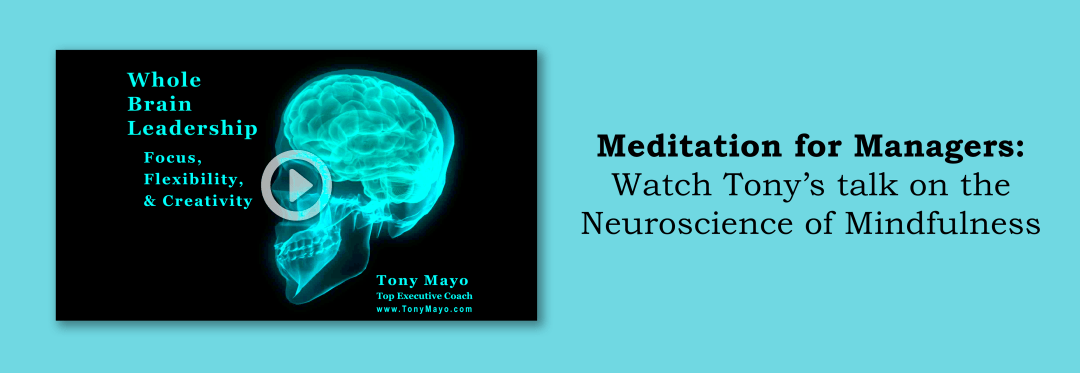by Tony Mayo | For Business Owners, Quotes and Aphorisms, Stress Management
Dr. Peter Suedfeld, a psychology professor at the University of British Columbia and an expert in human cognition. …told us that creativity is a “very mysterious thing” that “exists in pretty much everyone” — but that there are indeed ways to improve it. One method he has studied extensively is what he calls the Restricted Environmental Stimulation Technique (REST) — putting people into places with no light or outside stimuli.
“What I’ve found,” he said, “is that far from making people crazy, moderate deprivation lowers blood pressure, improves mood, and makes people more creative.”
From: “Outside the Box”: The Inside Story
By Martin Kihn, Fast Company, June 2005
Found in:
IDEAS IN THE NEWS
A biweekly publication of MeansBusiness
Vol. VI No. 8 — June 29, 2005
See free, easy Meditation Instructions on this blog.

by Tony Mayo | For Business Owners, Quotes and Aphorisms, Stress Management

You have to allow a certain amount of time in which you are doing nothing in order to have things occur to you, to let your mind think.
—Mortimer Adler
See free, easy Meditation Instructions on this blog.

by Tony Mayo | For Business Owners, For Executive Coaches, Leadership Development, Quotes and Aphorisms, Team Manager Skills
It is rare indeed that people give.
Most people guard and keep; they suppose that it is they themselves and what they identify with themselves that they are guarding and keeping, whereas what they are actually guarding and keeping is the system of reality in what they assume themselves to be. One can give nothing whatever without giving oneself – that is to say, risking oneself.
If one cannot risk oneself, then one is simply incapable of giving.
–The Price of the Ticket:
Collected Nonfiction 1948-1985
by James Baldwin
Page 370
by Tony Mayo | For Business Owners, Quotes and Aphorisms
 Are you willing to be sponged out, erased, canceled, made nothing?
Are you willing to be sponged out, erased, canceled, made nothing?
Are you willing to be made nothing,
dipped into oblivion?
If not, you will never really change.
D. H. Lawrence
Phoenix
quoted in Holotropic Mind
by Tony Mayo | For Business Owners, Quotes and Aphorisms, Team Manager Skills
This was a guy in one of their [Men’s Wearhouse] stores in the Northwest who was an exceptional salesperson. But the company’s managers believe in the concept of team selling — they believe in this idea of human development that you always succeed when your colleagues around you succeed, and that you ought to participate in all this training. And this guy said, “I’m not going to do any of this stuff.”
The company’s big measures are the number of transactions and the dollars of sales per transaction. This guy was way above on the number of transactions but not doing very well on dollars per transaction. What that meant was that people would come in the store and he would steal them. Finally, they said to this guy, “We want you to get with the program,” and he wouldn’t.
So they fired him — and guess what? Sales in the store went up 30 percent. His replacement, of course, did not sell as much as he did. But everybody else in the store sold more. In other words, he was bringing everybody else down. And you see this in other organizations where there is one star.
—Jeffrey Pfeffer
Strategy & Business
by Tony Mayo | For Business Owners, Quotes and Aphorisms, Sales Techniques
Boys learn abou t hierarchy from day one. They understand that the guy with the most power wins. Girls are taught to be nice. Nice people don’t negotiate, they learn to give in.
t hierarchy from day one. They understand that the guy with the most power wins. Girls are taught to be nice. Nice people don’t negotiate, they learn to give in.
Betty Carter, Ph.D.
in Psychology Today
Nov/Dec 97 p. 84
by Tony Mayo | For Business Owners, Quotes and Aphorisms
Life did not take over the globe by combat, but by networking.
–Margulis & Sagan
[widow and daughter, respectively, of astronomer Carl Sagan] in Microcosmos
by Tony Mayo | For Business Owners, Quotes and Aphorisms
I think the purpose of life is to be useful, to be responsible, to be honorable, to be compassionate. It is, after all, to matter: to count, to stand for something, to have made some difference that you lived at all.
Leo C. Rosten
Author of The Joys of Yiddish
by Tony Mayo | For Business Owners, How to Set Goals, Quotes and Aphorisms

It is the maxim of every prudent master of a family, never to attempt to make at home what it will cost him more to make than to buy. … What is prudence in the conduct of every private family can scarcely be folly in that of a great kingdom.
Adam Smith, 1723-1790
The Wealth of Nations
by Tony Mayo | For Business Owners, Quotes and Aphorisms
If we could get to know all the consequences of our actions history would be nothing but an idyllic and constant harmony of free wills, or the infallible unfolding of a rational design. We would then always act rationally, that is, we would not act at all, since we would simply follow a pre-established and sterile pattern. But then we would not be free.
We are free, however, and this means literally that we do not know what we are doing.
—Nicola Chiaromonte






Recent Comments